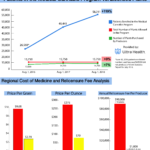
Department of Health releases approved cannabis cultivation plant count through July 31, 2019
(Albuquerque) – On August 1, 2018, the 35 commercial producers in New Mexico licensed a total of 14,700 plants for medical cannabis cultivation, representing a mere 7 percent increase in plants allowed since August 1, 2016. During the same two-year period, the number of patients in New Mexico’s Medical Cannabis Program has doubled.
The program’s increase of only 7 percent in plants allowed for medical cannabis cultivation is concerning, as enrollment and patient demand in the program continue to grow at an accelerated pace.
The number of licensed plants will remain unchanged until July 31, 2019, when providers have the next annual relicensure. While the New Mexico Department of Health (NMDOH) has not announced plans to increase the number of plants allowed, it is expected the program will swell to over 75,000 patients during the same period.
By failing to allow the state’s licensed producers to fully meet patient demand, the Medical Cannabis Program may, in effect, be forcing patients to pay unreasonably high prices and/or seek cannabis from the unregulated, illicit, or out of state markets.
LICENSED PLANTS VS PATIENT ENROLLMENT
In August of 2016, all 35 licensed producers were eligible to secure 450 plants each. A total of 13,800 plants were licensed on August 1, 2016 for the period ending July 31, 2017.
On August 1, 2018, the 35 producers licensed a total of 14,700 plants for the period ending July 31, 2019, representing growth of 7 percent or a flat trend compared to the exponential increase of patients enrolling in the program each year.
As of July 31, 2018, enrollment reached 58,211 patients according to data from the NMDOH. July’s enrollment represents an increase of 119 percent since June of 2016 when 26,568 patients were enrolled, while the number of licensed plants continues to lag behind.
By July 31, 2019, the growth rate in licensed plants will remain the same at 7 percent since August of 2016, while patient enrollment is expected to grow by 183 percent during the same three-year period.
REGIONAL PRICE AND RELICENSURE FEE ANALYSIS
The limited number of plants allowed to be grown by commercial producers in New Mexico has kept prices artificially high, further burdening patients in the program who pay out of pocket for their medicine.
The price per gram in New Mexico averages around $9.68, equating to $275 per ounce of medical cannabis. In the neighboring medical-only market in Arizona, ounces of medical cannabis are sold for as low as $79 per ounce or $2.79 per gram. The NMDOH also prohibits producers from providing discounts with higher volumes of medicine purchased, a patient-friendly practice that is commonly used elsewhere in both medical cannabis and pharmaceutical industries.
Since August 2016, NMDOH has collected $8.6 million in renewal fees from licensed producers. Annual renewal fees range from $40,000 to $90,000 per producer, or $200 per single plant, and must be collected each August for providers to participate in the program. These fees can be particularly burdensome for some providers, which inhibits their ability to license and grow the maximum of 450 plants.
Comparable fees in Arizona’s medical cannabis program, which has no limit on the number of plants allowed per licensed producer, is $1,000 annually per producer.
“While NMDOH is collecting exorbitant fees year after year, the department is simultaneously limiting the statutory purpose of the Medical Cannabis Program, which is to allow for the beneficial use of medical cannabis,” said Duke Rodriguez, CEO and President of Ultra Health®. “Arbitrary restrictions such as prohibiting patient discounts and limiting plants for cultivation are not supported in statute. These subjective restrictions are directly obstructing the Lynn and Erin Compassionate Use Act and nearly 60,000 New Mexicans’ legal right to fully benefit from the healthy use of cannabis.”
In August 2016, Ultra Health filed a complaint against the NMDOH to ensure an adequate supply, disputing the regulatory 450 plant count as arbitrary and capricious. The matter has been briefed before Judge David K. Thomson of the First Judicial District Court in Santa Fe and the parties are awaiting a decision.

